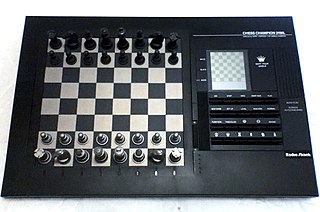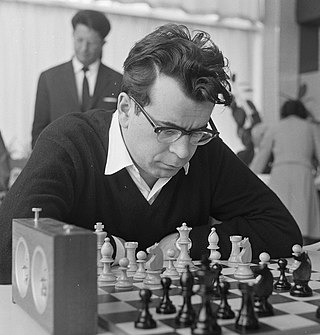
Chess is a board game for two players, called White and Black, each controlling an army of chess pieces, with the objective to checkmate the opponent's king. It is sometimes called international chess or Western chess to distinguish it from related games such as xiangqi and shogi. The recorded history of chess goes back at least to the emergence of a similar game, chaturanga, in seventh century India. The rules of chess as they are known today emerged in Europe at the end of the 15th century, with standardization and universal acceptance by the end of the 19th century. Today, chess is one of the world's most popular games, and is played by millions of people worldwide.

Computer chess includes both hardware and software capable of playing chess. Computer chess provides opportunities for players to practice even in the absence of human opponents, and also provides opportunities for analysis, entertainment and training. Computer chess applications that play at the level of a chess grandmaster or higher are available on hardware from supercomputers to smart phones. Standalone chess-playing machines are also available. Stockfish, Leela Chess Zero, GNU Chess, Fruit, and other free open source applications are available for various platforms.
This glossary of chess explains commonly used terms in chess, in alphabetical order. Some of these terms have their own pages, like fork and pin. For a list of unorthodox chess pieces, see Fairy chess piece; for a list of terms specific to chess problems, see Glossary of chess problems; for a list of named opening lines, see List of chess openings; for a list of chess-related games, see List of chess variants; for a list of terms general to board games, see Glossary of board games.

José Raúl Capablanca y Graupera was a Cuban chess player who was world chess champion from 1921 to 1927. A chess prodigy, he is widely renowned for his exceptional endgame skill and speed of play.

Correspondence chess is chess played by various forms of long-distance correspondence, traditionally through the postal system. Today it is usually played through a correspondence chess server, a public internet chess forum, or email. Less common methods that have been employed include fax, homing pigeon and phone. It is in contrast to over-the-board (OTB) chess, where the players sit at a chessboard at the same time, or play each other in real time via the internet.
The fifty-move rule in chess states that a player can claim a draw if no capture has been made and no pawn has been moved in the last fifty moves. The purpose of this rule is to prevent a player with no chance of winning from obstinately continuing to play indefinitely or seeking to win by tiring the opponent.
In chess, there are a number of ways that a game can end in a draw, neither player winning. Draws are codified by various rules of chess including stalemate, threefold repetition, and the fifty-move rule. Under the standard FIDE rules, a draw also occurs in a dead position, most commonly when neither player has sufficient material to checkmate the opponent.
Stalemate is a situation in chess where the player whose turn it is to move is not in check and has no legal move. Stalemate results in a draw. During the endgame, stalemate is a resource that can enable the player with the inferior position to draw the game rather than lose. In more complex positions, stalemate is much rarer, usually taking the form of a swindle that succeeds only if the superior side is inattentive. Stalemate is also a common theme in endgame studies and other chess problems.

In computer chess, a chess engine is a computer program that analyzes chess or chess variant positions, and generates a move or list of moves that it regards as strongest.

Fritz is a German chess program originally developed for Chessbase by Frans Morsch based on his Quest program, ported to DOS, and then Windows by Mathias Feist. With version 13, Morsch retired, and his engine was first replaced by Gyula Horvath's Pandix, and then with Fritz 15, Vasik Rajlich's Rybka.

Richard Selig Réti was an Austro-Hungarian, later Czechoslovak, chess player, chess author, and composer of endgame studies.

Pal Charles Benko was a Hungarian and American chess player, author, and composer of endgame studies and chess problems.

In chess, an endgame tablebase, or simply tablebase, is a computerised database containing precalculated evaluations of endgame positions. Tablebases are used to analyse finished games, as well as by chess engines to evaluate positions during play. Tablebases are typically exhaustive, covering every legal arrangement of a specific selection of pieces on the board, with both White and Black to move. For each position, the tablebase records the ultimate result of the game and the number of moves required to achieve that result, both assuming perfect play. Because every legal move in a covered position results in another covered position, the tablebase acts as an oracle that always provides the optimal move.
The opposite-colored bishops endgame is a chess endgame in which each side has a single bishop and those bishops operate on opposite-colored squares. Without other pieces besides pawns and the kings, these endings are widely known for their tendency to result in a draw. These are the most difficult endings in which to convert a small material advantage to a win. With additional pieces, the stronger side has more chances to win, but still not as many as when bishops are on the same color.
Solving chess consists of finding an optimal strategy for the game of chess; that is, one by which one of the players can always force a victory, or either can force a draw. It is also related to more generally solving chess-like games such as Capablanca chess and infinite chess. In a weaker sense, solving chess may refer to proving which one of the three possible outcomes is the result of two perfect players, without necessarily revealing the optimal strategy itself.

The following outline is provided as an overview of and topical guide to chess:

Chessgames.com is an Internet chess community with over 224,000 members. The site maintains a large database of chess games, where each game has its own discussion page for comments and analysis. Limited primarily to games where at least one player is of master strength, the database begins with the earliest known recorded games and is updated with games from current top-level tournaments. Basic membership is free, and the site is open to players at all levels of ability, with additional features available for Premium members. While the primary purpose of Chessgames.com is to provide an outlet for chess discussion and analysis, consultation games are periodically organized with teams of members playing either other teams of members or very strong masters, including a former US champion and two former world correspondence champions.

Chess.com is an internet chess server and social networking website. The site has a freemium model in which some features are available for free, and others are available for accounts with subscriptions. Live online chess can be played against other users in daily, rapid, blitz or bullet time controls, with a number of chess variants available. Chess versus a chess engine, computer analysis, chess puzzles and teaching resources are offered.

AlphaZero is a computer program developed by artificial intelligence research company DeepMind to master the games of chess, shogi and go. This algorithm uses an approach similar to AlphaGo Zero.
Edgar Walther was a Swiss chess player who held the titles of FIDE Master and International Correspondence Chess Master (1978). He was a Chess Olympiad individual medalist (1954).










